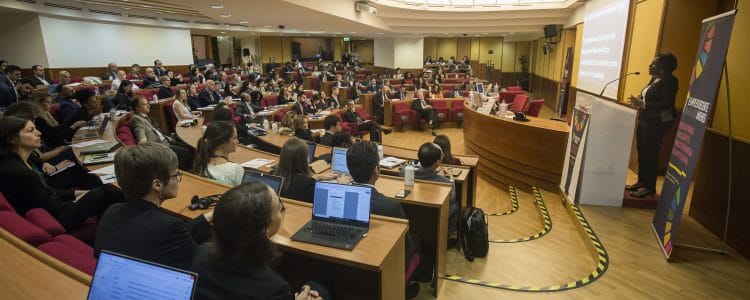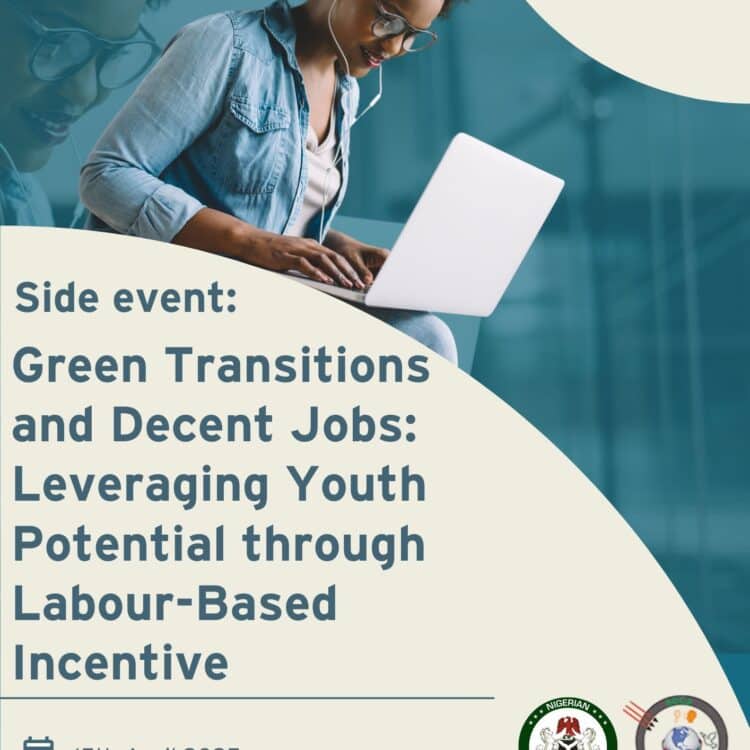
The rights and voices of youth matter! Youth should be properly represented and actively involved in solving today’s complex problems, especially if these problems are related to their future and their work opportunities. However, youth are not a homogenous group – not all youth are the same, want the same, or have the same opportunities.
Rome, Italy: “We need to stop saying that youth are the future, we are the present and we are relevant!”, declared Sania Haider Shikoh, a member of the United Nations Major Group for Children and Youth (UNMGCY). Sania is one of numerous young leaders invited to this year’s annual conference of the International Labour Organisation´s (ILO) ´Global Initiative on Decent Jobs for Youth’. The conference was held in Rome on 28 and 29 May and brought together more than 200 participants from different sectors across the globe. Under the tagline ‘Rights and Voices of Youth’, the event aimed to catalyse conversations and collaborations around innovations for decent jobs for youth, with a focus on the rights and voices of youth.
To ensure that the voices of youth are properly heard, the young speakers suggested that they should be involved at every stage of policies and interventions affecting youth: starting from the design phase, through to implementation, and finally monitoring and evaluation. Nothing for the youth, without the youth. This means that youth should also be at the table where the real decision-making power is, including advisory committees, steering groups, and trade union boards. Mainstreaming youth engagement should become the norm.
During the conference it was confirmed that ensuring decent jobs for all young people requires collective action and an inclusive approach. It is, therefore, important to acknowledge the heterogeneous nature of youth as a social group. Governments, academia, civil society organizations, and others need to introduce more nuances to the debate, accepting that different groups have different needs, which requires diverse representation. Otherwise, those lacking the proper recognition, access and representation will be left behind.
The research initiative ‘Boosting decent employment for Africa’s youth’ – a joint effort by INCLUDE, Canada’s International Development Research Centre (IDRC) and the International Labour Organization (ILO) – aims to deepen the knowledge and country evidence base on enhancing soft and digital skills for youth; fostering effective work-based learning and mentorship programmes; tackling gender constraints that hold women back; and identifying strategies for boosting the demand for labour. This is done under the umbrella of the Global Initiative on Decent Jobs for Youth. The conference allowed us to share this initiative.
On the first day, we presented the initiative in the plenary session on the collective impact of partners for Decent Jobs for Youth. This panel included speakers from the International Trade Centre, the International Telecommunications Union, and ILO. Then an interactive presentation was made on the initiative during the marketplace sessions, where the eight research projects that kicked off the initiative were showcased, as well as plans for the synthesis of evidence, reviews and policy engagement. The second day started with the moderation of a round table discussion on how to close the evidence gap at the strategic partners’ breakfast meeting, which brought together several representatives of organizations working in the knowledge field, such as JPAL, the Geneva Graduate Institute, UNICEF, the United Nations Department of Economic and Social Affairs (UNDESA), the Food and Agriculture Organization (FAO) and ILO. This was followed by a contribution to the expert session ‘Supporting the transition to decent jobs among youth in the rural economy’ and participation in the post-conference meeting of the Youth Employment Funders Group, under the theme ‘Keeping Youth Voices at the Forefront of our Investments’. This meeting brought together over 20 multilateral organizations and international donors, including private foundations, working together to generate and share knowledge on what works in the field of youth employment.
These various exchanges and interactions confirmed that our joint research initiative is well aligned with the spirit of the Global Initiative and has an important role to play in bringing together the resources and expertise of diverse partners and integrating youth not only as beneficiaries, but as key actors in the research process to maximize the positive impact of investments in youth employment and to make the existing knowledge more accessible.

Photo credits: Susanna Pak




